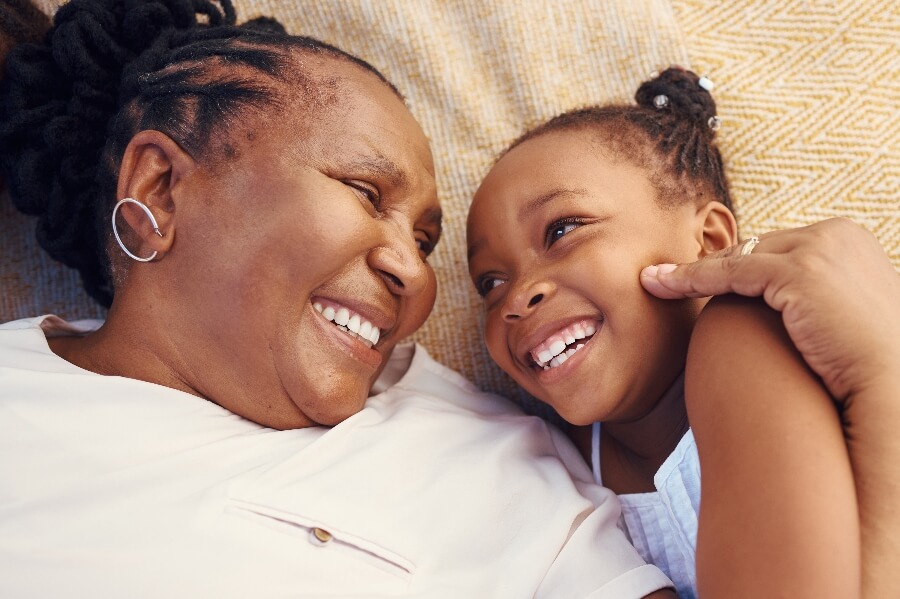I became a “Little Mama” early in my life. I was six years old, growing up in Brooklyn, and my after-school job was to pick up my three-year-old brother from daycare and walk him home. There were periods when my great-grandmother lived with us, and when she did, she took over when we got home. But when she wasn’t there, it was on me—make after-school snacks, supervise playtime, walk him to story hour at the library. and then, later, make sure he did his homework.
‘You’re more like my mother than my own mother,’ was a familiar refrain.
My great grandmother passed away when I was 10, and then I was in charge all the time. I remember almost setting the house on fire trying to make pasta and grabbing the pot with a dish towel that went up in flames because the burner was still on. During summer breaks and vacations, when my brother’s friends were called in for afternoon naps, I would call him in, too. Then I would turn on the TV and say, “Close your eyes during the commercials.” As I got older, I’d borrow parenting books from the library in a desperate attempt to figure out what was expected of me and how to best meet the challenges of “raising” a quickly changing, strong-willed boy.
After college, I became the caregiver for various adult members of the family. Not people who were sick, mind you, but people, who, through their own choices, couldn’t navigate the basics of adult life. I paid rent when they were threatened with eviction. I took the late-night calls when depression and anger raged. I helped with resumés, helped hunt for jobs, hired lawyers when there were arrests, and minded children when they weren’t able to. I sat in emergency rooms, and held vigil after funerals. “You’re more like my mother than my own mother,” was a familiar refrain. It was meant to be a compliment.
Setting Healthy Boundaries: What Happened When I Pulled Back

Image: Cecilie_Arcurs/E+/Getty Images
But anyone who’s ever had a tiff with a parent knows that the pendulum swings both ways. There’s need and then there’s frustration. I got a ton of that, too. Every time I dared to say, “No, or “I can’t” or “I won’t,” I was hit with this fury. In the eyes of the adults whom I’d tried to nurture and help, I’d made an unspoken agreement to mother them. And what do you do when you’re immature and not confident of your own strengths, and your mother checks out and you believe that you really really really need her? You lose your mind. I was cursed out and threatened, and that hurt. It was also frightening.
In my culture, calling a woman you love “Mami” is the same as saying she’s sexy and attractive and that you want to be with her.
I entered therapy early. But it took me a very long time to stop mothering people I did not give birth to: friends and boyfriends alike. I’m Afro-Latina, so there’s a strong strain of women as mothers in our culture. Calling a woman you love “Mami” is the same as saying she’s sexy and attractive and that you want to be with her. I had to learn to separate language from behavior. And in some instances, I just had to say, “Don’t call me Mami. I don’t like it.”
Even harder than changing my relationships with others was letting go of my own Joan of Arc complex. Whenever I looked in the mirror, I saw that strong, determined “Little Mama” that I had once been. I liked that kid. I was proud of her. It was hard to tell her she was being laid off. Fired. Retired. You don’t have to go home, but you can’t stay here. But I did send her packing, eventually. And it’s probably not a coincidence that letting go of all that mothering coincided almost precisely with meeting the man I would marry.
That “No More Mothering” Feeling
I am older than my husband Jason. (A fact I still kind of hate. Before him, all of my boyfriends had been older, sometimes a lot older. No big surprise there, I was probably looking for someone to parent me.) But when we got married, I told him, “Look, unlike a lot of women I know, I’ve never been pregnant. I have no idea how fertile I am. But this is the deal. I am just out of this mothering gig. I need to put some space between mothering grown people and even thinking about having a baby.” He agreed.
It took me five years before I was ready to think about having a child. I wrote books. I wrote for TV. We did stints in Japan, and because it had been my dream for as long as I could remember, we lived for a year in France. I remember standing one morning in our apartment in Paris, incredulous that this was my life and thinking, “What’s the next dream?” A month later, I was pregnant.
I told my husband, ‘I need some space between mothering grown people and even thinking about having a baby.’
It may seem like the painful elaboration of the obvious, but mothering a little one was so, so different than trying to parent a dysfunctional adult. It was so much sweeter and so much more fun. When my daughter began to speak and called me “Mama,” it was as if she were speaking a different language and we lived in a different universe. Every bit of my experience as a mother has been a world apart from the years I spent as a “little Mama.”
A few years ago, I was at a conference, and on a long hike, I bonded with a woman who, like me, was in her 40s. It turns out she’d been a “little Mama” too, a job that extended as it did for me, into her 20s and 30s. When I told her about the space I’d taken between ending that behavior and then having a child, she was almost tearful. “I wish I’d known that,” she said. “I just kept thinking I’ll never have children because I’m so done with being everybody’s Mama. If I’d had this talk earlier, I might have considered that motherhood had something to offer me.”
Recently, a young woman I mentor turned to me and said, “I love spending time with you. It’s like I’m a daughter to you.” The phrase made me cringe. I took a deep breath and explained that as encouraging as I might be of her, that was not our dynamic. By design, finally and happily, there’s only one person on earth who gets to call me Mama.
***
Veronica Chambers is a prolific author and journalist, best known for her critically acclaimed memoir Mama’s Girl, the young adult novel The Go-Between, and Yes Chef, which was co-authored with chef Marcus Samuelsson. She is the editor ofThe Meaning of Michelle: 16 Writers on the Iconic First Lady and How Her Journey Inspires Our Own.
Further Reading
Boundaries Updated and Expanded Edition: When to Say Yes, How to Say No To Take Control of Your Life
Setting Boundaries® with Your Adult Children: Six Steps to Hope and Healing for Struggling Parents
Where to Draw the Line: How to Set Healthy Boundaries Every Day




















0 Comments